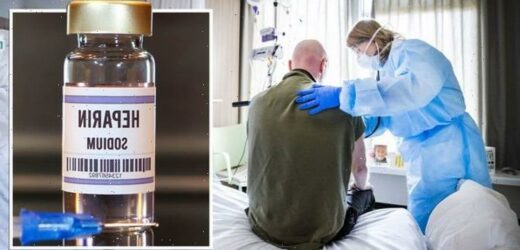NHS Covid App reported down by users across the UK
We use your sign-up to provide content in ways you’ve consented to and to improve our understanding of you. This may include adverts from us and 3rd parties based on our understanding. You can unsubscribe at any time. More info
The globally available drug heparin has been “confirmed” to lower the risk of death in moderately ill patients, according to a new study. Researchers at St Michael’s Hospital have tested a high, therapeutic dose of the drug against a prophylactic low dose. The drug was tested against patients admitted with COVID-19 who showed increased d-dimer levels – protein fragments produced when blood clots dissolve in the body.
Higher levels of d-dimers indicate a higher risk of blood clots forming.
Heparin is a popular blood thinner used to prevent the formation of clots in blood vessels.
The St Michael researchers studied a total of 465 patients across 28 hospitals in Brazil, Canada, Ireland, Saudi Arabia, United Arab Emirates and the US.
All patients were admitted to hospitals between May 29, 2020, and April 12, 2021, and were randomly assigned one of two doses of heparin.


According to the study’s results, a therapeutic dose of heparin did not appear to have an impact on the “primary outcome” – a combination of death, need for ventilation or admission to intensive care.
However, doses of the drug did appear to reduce the risk of death in about 78 percent of moderately ill patients.
The findings were published this week in the British Medical Journal.
Dr Peter Juni, Director of the Applied Health Research Centre at St. Michael’s and co-lead of the study, said: “Our study confirms therapeutic heparin is beneficial in patients who are on the ward with COVID-19, but other studies suggest it could be harmful for patients who are in critical care.”

A number of trials have investigated the potential therapeutic properties of heparin in the fight against COVID-19.
Coronavirus infections cause heightened inflammation and clotting in blood vessels, which contributes to severe cases and death.
High doses of heparin are presently used to treat deep vein thrombosis and pulmonary emboli.
Lower, prophylactic doses are given to patients to prevent blood clotting while they are in hospital.
Dr Michelle Sholzberg, Head of the Division of Hematology-Oncology and Director of the Coagulation Lab at St Michael’s, hopes the study’s findings will influence present Covid treatments.


She said: “This is a once-in-a-million opportunity – heparin is inexpensive, globally available, and exists in every single hospital pharmacy cabinet right now.
“It’s an opportunity to rapidly repurpose a drug available around the world.”
She added the treatment could possibly make a difference in those parts of the world where access to vaccines is limited.
Dr Sholzberg and her colleagues will continue to investigate the collected data.
They have also considered revisiting their patients to see whether the drug has had any effect on cases of long-Covid.
The study’s authors wrote: “The RAPID trial did not find a significant reduction in the primary composite outcome of death, mechanical ventilation, or ICU admission with therapeutic heparin.
“However, therapeutic heparin was associated with a substantially decreased odds of all cause death and low risk of major bleeding.
“In conjunction with the recently published multiplatform trial, the RAPID trial therefore suggests that therapeutic heparin is beneficial in moderately ill patients with COVID-19 admitted to hospital wards.”
Source: Read Full Article


